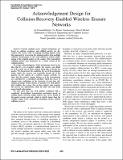Acknowledgement design for collision-recovery-enabled wireless erasure networks
Author(s)
Parandehgheibi, Ali; Sundararajan, Jay Kumar; Medard, Muriel
DownloadMedard_Acknowledgement design.pdf (441.0Kb)
PUBLISHER_POLICY
Publisher Policy
Article is made available in accordance with the publisher's policy and may be subject to US copyright law. Please refer to the publisher's site for terms of use.
Terms of use
Metadata
Show full item recordAbstract
Current medium access control mechanisms are based on collision avoidance and collided packets are discarded. The recent work on ZigZag decoding departs from this approach by recovering the original packets from multiple collisions. In this paper, we view each collision as a linear combination of the original packets at the senders. The transmitted, colliding packets may themselves be a coded version of the original packets. We design acknowledgment (ACK) mechanisms based on the idea that if a set of packets collide, the receiver can afford to ACK exactly one of them without being able to decode the packet. We characterize the conditions for an ACK mechanism under which the receiver can eventually decode all of the packets. In the context of a wireless erasure network, we show that the senders' queues behave as if the transmissions are controlled by a centralized scheduler which has access to channel state realizations at the beginning of each time slot. Taking advantage of this relation, we propose two ACK policies that stabilizes the system. One of these policies only requires the arrival rate information, while the other one only needs queue-length information. We also show that our ACK policies combined with a completely decentralized transmission mechanism based on random linear network coding achieves the cut-set bound of the packet erasure network, which is strictly larger than the stability region of the centralized scheduling schemes without collision recovery.
Date issued
2010-10Department
Massachusetts Institute of Technology. Department of Electrical Engineering and Computer Science; Massachusetts Institute of Technology. Research Laboratory of ElectronicsJournal
Proceedings of the 48th Annual Allerton Conference on Communication, Control, and Computing (Allerton), 2010
Publisher
Institute of Electrical and Electronics Engineers (IEEE)
Citation
ParandehGheibi, Ali, Jay Kumar Sundararajan, and Muriel Medard. “Acknowledgement Design for Collision-recovery-enabled Wireless Erasure Networks.” 48th Annual Allerton Conference on Communication, Control, and Computing (Allerton), 2010. 435–442. © Copyright 2010 IEEE
Version: Final published version
ISBN
978-1-4244-8215-3